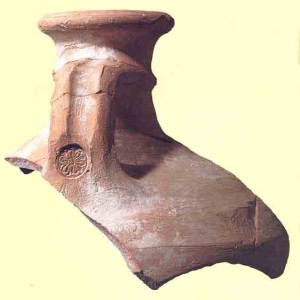 Those Rabbis who lived through the destruction of the Temple had to come to terms with it and to decide how it would be commemorated henceforth. Resisting the impulse of depression which decreed the halting of ordinary activities, they affirmed that life must go on and daily affairs must be restored to normal.
Those Rabbis who lived through the destruction of the Temple had to come to terms with it and to decide how it would be commemorated henceforth. Resisting the impulse of depression which decreed the halting of ordinary activities, they affirmed that life must go on and daily affairs must be restored to normal.
(10) Rabban Simeon ben Gamliel said, “From the day that the Temple was destroyed, it would have been logical that we not eat meat and not drink wine. However, the court may not decree upon the congregation things to which they are unable to adhere.”
He used to say, “Since they are uprooting the Torah from our midst, let us decree upon the world that it should be desolate- that one may not marry a wife, nor have children, nor celebrate the circumcision feast, until the seed of Abraham disappears on its own.” They said to him, “Rather, it is better for the community that they act in error rather than intentionally.”
(11) From the time when the latter (Second) Temple was destroyed, ascetics became numerous in Israel, and they would not eat meat and they would not drink wine. Rabbi Joshua went to address them. He said to them, “My children, why do you not eat meat?” They said to him, “How can we eat meat? Every day the daily sacrifice used to be offered upon the altar, and now it is no longer [offered].”
He said to them, “Why do you not drink wine?”
They said to him, “How can we drink wine? Every day it was poured out for libation on the altar, and now it is no longer [poured].”
(12) He said to them, “Let us not eat even figs and grapes, for they used to bring first- fruits from them on Shavuot. Let us not eat bread, for they used to bring the two loaves 73 and the showbread from them. Let us not drink water, for they used to offer libations from it on Sukkot.”
They were silent.
He said to them, “Not to mourn at all is not feasible, for the decree has already been decreed. But further, to mourn excessively (also) is not feasible. Rather, thus the sages have said, ‘A man shall plaster his home with plaster and leave over a small bit as a remembrance of Jerusalem.
(13) ‘A man may prepare all the needs of a meal, and leave off a little bit as a remembrance of Jerusalem.
(14) ‘A woman may prepare all her ornaments and leave off a little bit as a remembrance of Jerusalem,’ as it is said, ‘If I forget you, O Jerusalem, let my right hand forget its cunning; let my tongue cleave to my palate if I do not remember you, if I do not set Jerusalem above my highest joy,’ (Ps. 137-5).”
(15) All who mourn over Jerusalem will merit to see her joy, as it is said, “Rejoice with Jerusalem and be glad for her, all who love her, join in her jubilation all who mourn over her” (Is. 66-10).
72. Trans. S. Berrin from S. Lieberman, ed., Tosefta, Nashim 2 (New York- Jewish Theological Seminary of America, 1973) 242-244. The text presented here is a reconstruction from Manuscripts Erfurt and Vienna.
73. Offered also on Shavuot.